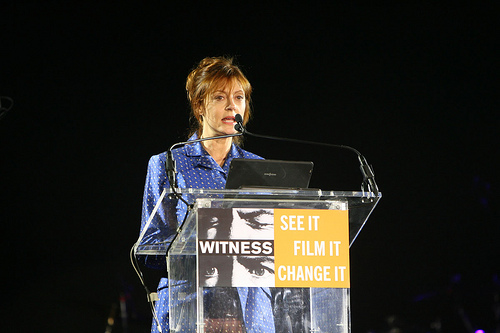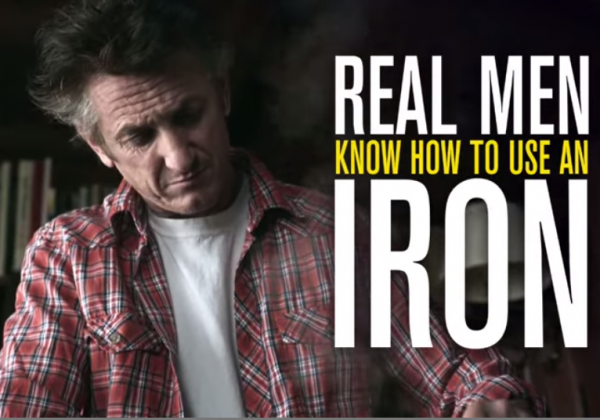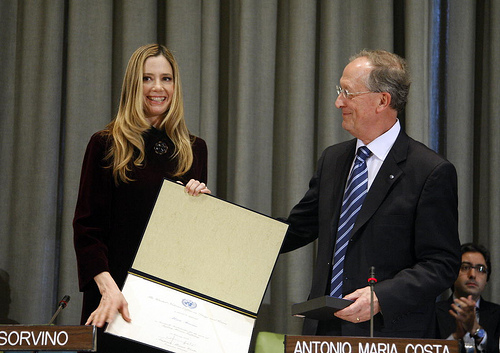For her third installment of Big Mother Is Watching You, a guide to prominent anti-sex worker activists and officials, Robin D goes to Hollywood to check out do-gooder celebrities and the whorephobic campaigns they run.
Susan Sarandon and Meg Ryan


Susan Sarandon and Meg Ryan were key players in NGO fraud Somaly Mam’s ascendence in Hollywood. Mam is the celebrity activist exposed by Newsweek in 2014, after a slew of articles about her fabrications appeared in The Cambodia Daily in 2012 and 2013. She ran a re-education camp filled through brothel raids and therefore populated by local sex workers held against their will and others deemed to be “at risk” through Mam’s organization AFESIP (Agir Pour Les Femmes en Situations Precaires). Both populations were instructed on at least several occasions to lie about their stories and concoct trafficking tragedy porn to relate to visitors and journalists.
“I have been personally inspired by the work of Somaly Mam and I encourage anyone who can devote time and money to help Mam continue to make a difference in this world,” Sarandon stated on the Somaly Mam Foundation website. Ryan appears in Nicholas Kristof’s documentary Half the Sky, which lauded Mam’s organizations for their work. Both Sarandon and Ryan were photographed multiple times with Mam at various Hollywood events and fundraisers.
Sarandon seems to have missed the point of the May 2014 expose of Mam in Newsweek, saying that she continues to believe Mam’s story regardless. Mam’s victims, though, apparently aren’t worth her consideration. Sarandon has made no public statement on the testimony of the women now saying that Mam coached them to lie and fabricate horror stories about being trafficked, including Srey Mao and Meas Ratha; nor on the medical records on purported Mam trafficking victim Long Pros’ eye, proving that her eye was removed in surgery for a tumor and not by an imaginary pimp gouging it out; nor the untold many sex workers who have been and continue to be imprisoned in “rehabilitation centers,” including AFESIP’s center.
Ashton Kutcher and Demi Moore

Ashton Kutcher and Demi Moore started the DNA (Demi and Ashton) Foundation, now Thorn, in 2009. Thorn’s corporate partners include anti-sex worker rescue industry organizations Polaris, GEMS, and the Somaly Mam Foundation.
DNA/THORN’s biggest “achievement” to date is a rather weird piece of propaganda entitled “Real Men Don’t Buy Girls.”
“Real men do their own laundry; real men don’t buy girls;” does Ashton Kutcher think “not doing one’s laundry” is equivalent to “buying girls”? What does he think it even means to “buy girls”? His statements about this have been inconsistent, and it is often hard to tell whether he is talking about any purchase of sexual services, about purchasing sexual services from minors and/or trafficking victims or their traffickers, about doing so with knowledge of their situation or without, about the actual literal purchase of sex slaves, etc. It’s possible Kutcher himself doesn’t know what he means.
“It’s between 100,000 and 300,000 child sex slaves in the United States today,” Ashton Kutcher told CNN’s Piers Morgan in 2011, erroneously referring to a study involving youth proposed to only be “at risk” of sex trafficking. He was the subject of an extensive fact-checking piece critiquing his statements on the prevalence of prostitution among minors, called “Real Men Get Their Facts Straight,” in the Village Voice in 2011.
Sean Penn

Sean Penn’s video for “Real Men Don’t Buy Girls” is more than a little creepy for those who remember his domestic violence against Madonna. “Real Men Know How to Use an Iron”? Do “real men” also know how to use a baseball bat to beat their wives for nine hours? How about tying them to a chair and threatening to shave their heads? Seems like “real men don’t commit felony domestic assault” might be a better message for Sean Penn to perpetuate than “real men don’t buy girls,” whatever he thinks that means.
Jada Pinkett-Smith

Jada Pinkett Smith is another Hollywood actress turned anti-sex trafficking campaigner. She has even testified to the U.S. Congress on trafficking as though administering her NGO—luridly titled “Don’t Sell Bodies”—has made her an expert.
Jada Pinkett Smith has worked extensively with professional sex trafficking survivor Minh Dang, whose story is unusual in that it involves Dang being abused and pimped by both parents while also being a model student and athlete throughout uninterrupted attendance in high school and college. The fact that this is improbable does not mean it is untrue, but it is certainly not the norm among survivors of third party coercion in the sex trade nor among minors involved in the sex trade. One might consider why Pinkett Smith might want this particular survivor as an employee. Many mainstream trafficking organizations seek out people that they can put forward as sex trafficking victims, but in a dynamic invoking respectability politics, so many of those chosen are privileged in the extreme compared to the general populations of survivors of coercion and underaged youth in the sex trade. Dang also recently left the organization, which may be because Somaly Mam’s downfall brought increased scrutiny to bear on her story.
Pinkett Smith also produced a documentary about human trafficking in strip clubs in Seattle called Rape for Profit. The blurb for this documentary on its site is disturbing on a number of levels. It is described as being the product of hundreds of hours of ride-along footage, including undercover sting operations. Did every person filmed sign a release? Did they know they would be filmed and give permission? Seems unlikely, doesn’t it?
The description of the documentary also parrots the widely-discredited statistic that 300,000 underage girls are trafficked in the U.S. every year (for reference, this mean that about 1% of underage girls in the U.S. are trafficked every year—are 10% trafficked every decade? Were 1 in 10 of the girls you know trafficked in the past decade? 3 in 10 in the last 30 years?). She is working on a similar CNN documentary about Atlanta clubs, stating that “strip clubs are breeding grounds for sex trafficking.” Atlanta, notably, is a city whose John School and Dear John social marketing campaign were cited as a success by Swanee Hunt’s Demand Abolition.
Mira Sorvino

Mira Sorvino, the UN Office on Drugs and Crime’s Goodwill Ambassador Against Human Trafficking, visited Cambodia in 2013 with the CNN Freedom Project. Michelle Tolson reported at Asian Correspondent on the Freedom Project:
Asian Correspondent went to Toul Kork district of Phnom Penh to the office of Women’s Network for Unity (WNU), a sex worker-led collective, to get their thoughts on the story. “You show the face of the mother, who is so poor that she has to sell her daughter for money? How does this help the daughter or mother?” asked Ros Sokunthy, Legal Services Manager for WNU. “It doesn’t. It helps the NGO to make money.”
…“Did they [the women] consent to have their pictures taken? Many people don’t know their human rights. […],” said Ros.
The Women’s Network for Unity is a sex worker organization in Cambodia that was established in 2000 and currently has about 6,400 members. Many foreign-based NGOs in Cambodia, on the other hand, like Agape International Mission and others whose work the CNN Freedom Project supported, exist largely to “re-educate” sex workers to do poorly-paid work in the garment sector, selling toiletries, or other similar work that does not pay a living wage, and the victims of these re-education camps therefore frequently return to sex work. Pen Sothary, Secretary of WNU, explains, “The girl consents to do the job but is taken away [by NGOs] to ‘improve their skills,’ to get re-education training. You [Northern NGOs] always think you know what they want, but you don’t even ask them.” The Asia Pacific Network of Sex Work Projects uses the slogan, “Don’t talk to me about sewing machines, talk to me about workers’ rights.”
Sorvino was almost comical in her CNN reports. At one point, about six minutes into this video, she castigates local Khmer and Vietnamese migrant men loitering in the street, assuming they are pimps selling sexual services. She strikes quite the figure, a Western actress with a $12 million net worth railing against working-class Southeast Asian men whom she accuses baselessly of selling the services of underage girls. She goes so far as to compare them to rats and roaches scattering in the sunlight, proclaiming, “it’s not ok to sell children to pedophiles”—as if this insight could only come from her Western perspective. Meanwhile, she and the Western NGOs she represents have no clue about the actual needs of the population they claim to serve.
I’m pretty sure Mira Sorvino’s net worth is only $12 million, not $12 billion.
The hypocrisy with these actors’ approach is that they don’t think to bring everyone else on the planet the same labor rights they have. The screen actors guild hand book for young people….
Rule #1-work union
http://youngperformers.sagaftra.org/files/youngperformers/YPH_FNL3.pdf
I don’t doubt Minh Dang especially after reading Domestic Minor Sex Trafficking by Alexandra Lutnick and I would like to emphasize that youth are trafficked in a variety of situations, though the point about respectability politics still stands.